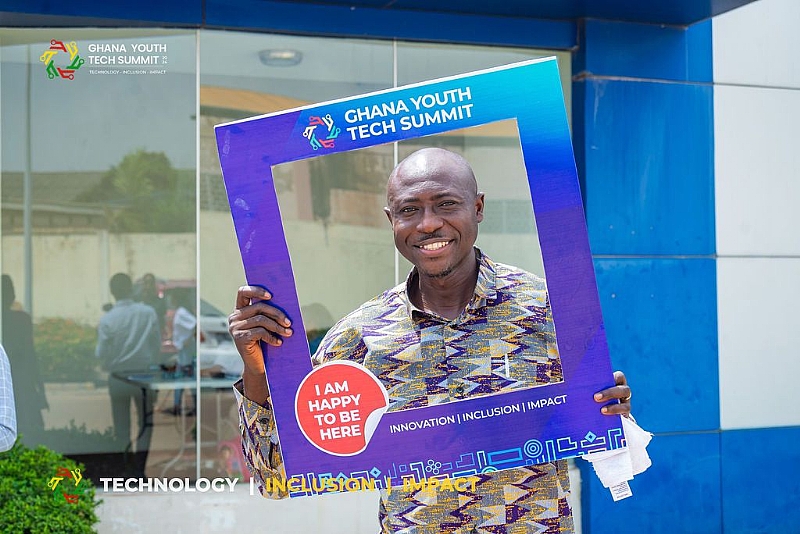The Ghana Youth Tech Summit, convened at the Accra Digital Center, served as a vibrant hub for young people, educators, and innovators to explore the transformative potential of technology in driving social impact. Under the banner of “Leveraging Technology for Social Impact,” the summit emphasized the importance of equipping the next generation of internet users with the knowledge and skills to navigate the digital landscape responsibly and effectively. This core message resonated throughout the event, highlighting the duality of technology as both a powerful tool for progress and a potential source of harm if misused. The summit underscored the need for a balanced approach, embracing the opportunities while mitigating the risks associated with the digital age.
A key highlight of the summit was the keynote address delivered by Gabriel Ofori Appiah, Director of Safeguarding, Awareness, and Outreach at the Ghana Internet Safety Foundation (GISF). Appiah’s presentation eloquently articulated the immense, yet largely untapped, potential of technology. He pointed out that only a fraction of the capabilities of digital devices are currently utilized, leaving a vast expanse of unexplored potential. This untapped potential, while holding immense promise, also represents a realm of vulnerability, emphasizing the critical need for responsible usage. Appiah drew a parallel with the “dark web,” representing the unexplored and potentially dangerous aspects of the digital world. He stressed the imperative of wielding technology judiciously, acknowledging its capacity for both good and bad, while cautioning that the negative consequences can often overshadow the positive. His message served as a powerful reminder of the responsibility that comes with access to technology.
Appiah underscored the transformative role technology plays in democratizing access to education, bringing learning opportunities directly to individuals’ homes. He celebrated this accessibility while simultaneously emphasizing the crucial need for caution and purpose in navigating the digital space. Using a vivid analogy, he compared technology to a blade: a valuable tool capable of achieving great things but equally capable of inflicting harm if mishandled. This analogy effectively highlighted the importance of responsible digital citizenship. He challenged the youth to become agents of change, harnessing their technological skills in areas such as web design and robotics to create safer and more impactful digital tools. This call to action empowered attendees to view themselves not just as consumers of technology but as creators and innovators within the digital landscape.
A crucial aspect of Appiah’s message focused on the importance of critical thinking in online interactions. He cautioned against the impulsive nature of online posting, urging participants to pause and reflect on the helpfulness, necessity, kindness, and overall impact of their digital contributions. He emphasized the potential long-term consequences of thoughtless online activity, reminding the audience that “online abuse is still abuse.” This served as a stark reminder of the permanence and reach of digital content. He further elaborated on the range of online risks young people face, including cyberbullying, grooming, sextortion, and addiction, underscoring the need for proactive strategies and advanced technological solutions, such as artificial intelligence and robotics, to combat these evolving threats.
To empower young people to navigate the digital world safely and responsibly, Appiah introduced the concept of “smart digital practices.” These practices encompassed a range of essential online safety guidelines, including protecting personal information, exercising caution when interacting with strangers online, verifying information and connections, reflecting on content before posting, and reporting any concerning online experiences to trusted adults. By outlining these clear and actionable steps, he provided attendees with a practical framework for fostering a safer and more positive online experience. This emphasis on proactive safety measures aimed to equip young people with the tools and knowledge to protect themselves and others in the digital sphere.
Beyond promoting online safety, Appiah encouraged the youth to channel their creativity and resources towards developing technological innovations that address social challenges. He urged them to conceive and design safer websites, devise clean energy solutions, and create platforms that promote sustainability and inclusivity. By framing technology as a tool for positive social impact, he inspired attendees to view themselves as potential solution providers and agents of change. This emphasis on innovation and social responsibility underscored the immense potential of technology to contribute to a better future for Ghana and the global community. The summit served as a powerful platform to ignite the passion and creativity of the next generation of tech leaders, empowering them to harness the power of technology for the greater good. The overarching message emphasized that a “better internet is a safer internet,” encapsulating the interconnectedness of responsible usage and positive social impact.


